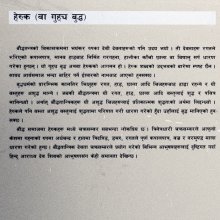Spashta, Spaṣṭa: 17 definitions
Introduction:
Spashta means something in Hinduism, Sanskrit, the history of ancient India, Marathi, Hindi. If you want to know the exact meaning, history, etymology or English translation of this term then check out the descriptions on this page. Add your comment or reference to a book if you want to contribute to this summary article.
The Sanskrit term Spaṣṭa can be transliterated into English as Spasta or Spashta, using the IAST transliteration scheme (?).
Alternative spellings of this word include Spasht.
Images (photo gallery)
In Hinduism
Shaktism (Shakta philosophy)
Source: Google Books: ManthanabhairavatantramSpaṣṭa (स्पष्ट) refers to “that which is clear” (i.e., to be understood?), according to the commentary on the Ṣaṭsāhasrasaṃhitā, an expansion of the Kubjikāmatatantra: the earliest popular and most authoritative Tantra of the Kubjikā cult.—Accordingly, “[...] Again, (the seeds of) the Ages should be worshipped in the corners or, having entered therein, within the field, village, town, sacred seat or city. One should reside there and then (the energy) of the worlds is aroused and one gets worldly pleasure and accomplishment (siddhi). (The rest is) clear [i.e., spaṣṭa]. (This is where they are worshipped) externally”.
Source: archive.org: Shakti and ShaktaSpaṣṭa (स्पष्ट) or Spaṣṭavācā refers to “that which is distinctly and audibly (recited)”, according to the Jñānārṇava-tantra, XX.—Accordingly, “Japa is defined as vidhanena mantroccāraṇaṃ, that is (for default of other more suitable words), the utterance or recitation of Mantra according to certain rules. Japa may however be of a nature which is not defined by the word, recitation. It is of three kinds namely, vācika-japa, upāṃśu-japa, mānasa-japa. [...] Vācika is verbal Japa in which the Mantra is distinctly and audibly recited (spaṣṭa-vācā). [...]”.

Shakta (शाक्त, śākta) or Shaktism (śāktism) represents a tradition of Hinduism where the Goddess (Devi) is revered and worshipped. Shakta literature includes a range of scriptures, including various Agamas and Tantras, although its roots may be traced back to the Vedas.
Jyotisha (astronomy and astrology)
Source: Wisdom Library: Brihat Samhita by VarahamihiraSpaṣṭa (स्पष्ट) refers to “clear” (i.e., writing a ‘clear’ treatise), according to the Bṛhatsaṃhitā (chapter 1), an encyclopedic Sanskrit work written by Varāhamihira mainly focusing on the science of ancient Indian astronomy astronomy (Jyotiṣa).—Accordingly, “Glory be to the Sun who is the author and the Soul of the Universe, the ornament of the firmament and who is enveloped in a thousand rays of the colour of molten gold. Having correctly examined the substance of the voluminous works of the sages of the past, I attempt to write a clear [i.e., spaṣṭa] treatise neither too long nor too short”.

Jyotisha (ज्योतिष, jyotiṣa or jyotish) refers to ‘astronomy’ or “Vedic astrology” and represents the fifth of the six Vedangas (additional sciences to be studied along with the Vedas). Jyotisha concerns itself with the study and prediction of the movements of celestial bodies, in order to calculate the auspicious time for rituals and ceremonies.
Shaivism (Shaiva philosophy)
Source: Brill: Śaivism and the Tantric TraditionsSpaṣṭa (स्पष्ट) refers to “distinctly” (as opposed to Aspaṣṭa—‘indistinctly’), as quoted by Hṛdayaśiva in his Prāyaścittasamuccaya (verse 10.27-35).—Accordingly, “Having recited [a particular mantra] along with [the practice of one of the] observances in accordance with the rules, and having bathed [at the end of the observance], one may recite that mantra for attaining supernatural powers. The skilled practitioner should do his recitation not too slowly, not indistinctly (aspaṣṭa), not without taking [the meaning of what he recites] in, not too fast, not without counting, and not with his thoughts in confusion. [...]”.

Shaiva (शैव, śaiva) or Shaivism (śaivism) represents a tradition of Hinduism worshiping Shiva as the supreme being. Closely related to Shaktism, Shaiva literature includes a range of scriptures, including Tantras, while the root of this tradition may be traced back to the ancient Vedas.
India history and geography
Source: Cologne Digital Sanskrit Dictionaries: Indian Epigraphical GlossarySpaṣṭa.—(CII 3), an astronomical term meaning ‘apparent’; cf. spaṣṭa-tithi, ‘an apparent tithi’, from which the mean tithi has to be determined. Note: spaṣṭa is defined in the “Indian epigraphical glossary” as it can be found on ancient inscriptions commonly written in Sanskrit, Prakrit or Dravidian languages.

The history of India traces the identification of countries, villages, towns and other regions of India, as well as mythology, zoology, royal dynasties, rulers, tribes, local festivities and traditions and regional languages. Ancient India enjoyed religious freedom and encourages the path of Dharma, a concept common to Buddhism, Hinduism, and Jainism.
Languages of India and abroad
Marathi-English dictionary
Source: DDSA: The Molesworth Marathi and English Dictionaryspaṣṭa (स्पष्ट).—a (S) Clear, plain, distinct, apparent, evident, manifest, open. 2 Rigidly and closely accurate;--as a calculation or computation. A term of almanack-makers and astronomers.
Source: DDSA: The Aryabhusan school dictionary, Marathi-Englishspaṣṭa (स्पष्ट).—a Clear, evident; rigidly and closely accurate.
Marathi is an Indo-European language having over 70 million native speakers people in (predominantly) Maharashtra India. Marathi, like many other Indo-Aryan languages, evolved from early forms of Prakrit, which itself is a subset of Sanskrit, one of the most ancient languages of the world.
Sanskrit dictionary
Source: DDSA: The practical Sanskrit-English dictionarySpaṣṭa (स्पष्ट).—a. [spaś-kta ni° iḍabhāvaḥ]
1) Distinctly visible, evident, cleary perceived, clear, plain, manifest; स्पष्टे जाते प्रत्यूषे (spaṣṭe jāte pratyūṣe) K. 'when it was broad day-break'; स्पष्टाकृतिः (spaṣṭākṛtiḥ) R.18.3; स्पष्टार्थः (spaṣṭārthaḥ) &c.
2) Real, true.
3) Full-blown. expanded.
4) One who sees clearly.
-ṣṭam ind.
1) Clearly, distinctly, plainly.
2) Openly, boldly. (spaṣṭīkṛ means 'to make clear or distinct', explain, elucidate.)
Source: Cologne Digital Sanskrit Dictionaries: Shabda-Sagara Sanskrit-English DictionarySpaṣṭa (स्पष्ट).—mfn.
(-ṣṭaḥ-ṣṭā-ṣṭaṃ) 1. Evident, manifest, apparent. 2. Clear, easy, intelligible. 3. True, real. E. spaś to make clear, aff. kta .
Source: Cologne Digital Sanskrit Dictionaries: Benfey Sanskrit-English DictionarySpaṣṭa (स्पष्ट).—i. e. the ptcple. pf. pass. of spaś (see dṛś), 1. Evident, [Vedāntasāra, (in my Chrestomathy.)] in
Spaṣṭa (स्पष्ट).—[adjective] visible, discernible, distinct, manifest, clear; [neuter] [adverb]
Source: Cologne Digital Sanskrit Dictionaries: Monier-Williams Sanskrit-English Dictionary1) Spaṣṭa (स्पष्ट):—[from spaś] 1. spaṣṭa mfn. clearly perceived or discerned, distinctly visible, distinct, clear, evident, plain, intelligible, [Taittirīya-saṃhitā] etc. etc.
2) [v.s. ...] straight (opp. to ‘crooked’), [Varāha-mihira’s Bṛhat-saṃhitā; Kathāsaritsāgara]
3) [v.s. ...] real, true, correct, [Gaṇitādhyāya; Golādhyāya]
4) [v.s. ...] one who sees clearly, [Monier-Williams’ Sanskrit-English Dictionary]
5) [from spaś] 2. spaṣṭa mfn. (for 1. See [column]2) bound, fettered etc., [Pāṇini 7-2, 27.]
Source: Cologne Digital Sanskrit Dictionaries: Yates Sanskrit-English DictionarySpaṣṭa (स्पष्ट):—[(ṣṭaḥ-ṣṭā-ṣṭaṃ) a.] Evident, clear.
Source: DDSA: Paia-sadda-mahannavo; a comprehensive Prakrit Hindi dictionary (S)Spaṣṭa (स्पष्ट) in the Sanskrit language is related to the Prakrit word: Pharisiya.
[Sanskrit to German]
Sanskrit, also spelled संस्कृतम् (saṃskṛtam), is an ancient language of India commonly seen as the grandmother of the Indo-European language family (even English!). Closely allied with Prakrit and Pali, Sanskrit is more exhaustive in both grammar and terms and has the most extensive collection of literature in the world, greatly surpassing its sister-languages Greek and Latin.
Hindi dictionary
Source: DDSA: A practical Hindi-English dictionarySpaṣṭa (स्पष्ट) [Also spelled spasht]:—(a) clear; vivid, lucid; evident, apparent; obvious; articulate, distinct; positive, unambiguous, conspicuous; intelligible; express; explicit, blunt, categorical, point-blank, plain; ~[ta:] clearly; vividly, lucidly; plainly; obviously; apparently; distinctly; expressly, explicitly; bluntly; ~[tayā] plainly, clearly, lucidly; obviously; ~[tā] clarity, clearness, vividness, lucidity; obviousness; openness; •[pūrvaka/se] clearly; lucidly, obviously, vividly; expressly; ~[bhāṣī/vaktā/vādī] outspoken, straight-forward, plain-speaking; —[rūpa se] distinctly, clearly, ostensibly, obviously.
...
Kannada-English dictionary
Source: Alar: Kannada-English corpusSpaṣṭa (ಸ್ಪಷ್ಟ):—
1) [adjective] not faint or blurred; easily seen or heard; distinct; clear.
2) [adjective] existing or happening as or in fact; actual, true, etc.; real.
3) [adjective] (said of flowers) fully blown, expanded.
Kannada is a Dravidian language (as opposed to the Indo-European language family) mainly spoken in the southwestern region of India.
See also (Relevant definitions)
Starts with (+7): Spashta-garnu, Spashta-rupama, Spashtabhashin, Spashtagarbha, Spashtagraha, Spashtakranti, Spashtakshara, Spashtam, Spashtama, Spashtapama, Spashtaparidhi, Spashtapratipatti, Spashtartha, Spashtasira, Spashtasnayugana, Spashtata, Spashtatah, Spashtatara, Spashtataraka, Spashtavaca.
Ends with: Anuspashta, Aspashta, Avispashta, Duspashta, Nihspashta, Pravispashta, Rathaspashta, Samspashta, Suspashta, Suvispashta, Svatahspashta, Vispashta.
Full-text (+35): Spashtam, Vispashta, Aspashta, Spashtartha, Vispashtam, Suspashtam, Spashtavaktri, Spashtabhashin, Spashtapratipatti, Spashtagarbha, Spashtetara, Spashtakshara, Spash, Vispashtata, Spashtata, Aspashtakirti, Pashta, Spashtatara, Spashtataraka, Anuspashta.
Relevant text
Search found 20 books and stories containing Spashta, Spaṣṭa, Spasta; (plurals include: Spashtas, Spaṣṭas, Spastas). You can also click to the full overview containing English textual excerpts. Below are direct links for the most relevant articles:
The Tattvasangraha [with commentary] (by Ganganatha Jha)
Verse 2055-2056 < [Chapter 23 - External World]
Verse 324 < [Chapter 7 - Doctrine of the Self (ātman, ‘soul’)]
Verse 515 < [Chapter 9 - Examination of the Relation between Actions and their Results]
Rig Veda (translation and commentary) (by H. H. Wilson)
Bhakti-rasamrta-sindhu (by Śrīla Rūpa Gosvāmī)
Verse 3.3.128 < [Part 3 - Fraternal Devotion (sakhya-rasa)]
Verse 3.2.1 < [Part 2 - Affection and Service (dāsya-rasa)]
Yogadrstisamuccaya of Haribhadra Suri (Study) (by Riddhi J. Shah)
Chapter 4.2a - The Second: Tārādṛṣṭi (tārā-dṛṣṭi)—Introduction < [Chapter 4 - The Eight Yogadṛṣṭis and the nature of a Liberated Soul]
Chapter 4.7b - Dhyāna (meditation) < [Chapter 4 - The Eight Yogadṛṣṭis and the nature of a Liberated Soul]
Taittiriya Upanishad Bhashya Vartika (by R. Balasubramanian)
Verse 2.458 < [Book 2 - Brahmavallī]
Brahma Sutras (Shankara Bhashya) (by Swami Vireshwarananda)
Chapter IV, Section II, Adhikarana VI < [Section II]

